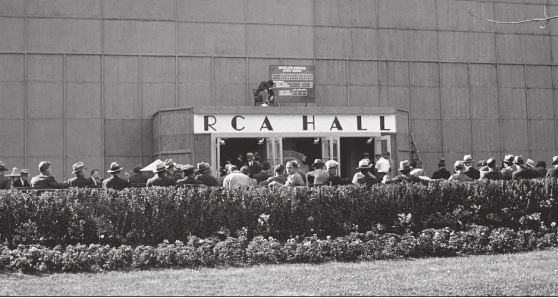
The CBC campus on Western Boulevard has been dubbed “Celebration Central”. We celebrated the 60th Anniversary of WRAL on December 15, 2016 and then we puffed up our peacock feathers on February 28 marking our one year anniversary as an NBC affiliate. But we have one more anniversary to acknowledge and it is a big one. Capitol Broadcasting Company came into existence on March 19, 1937. CBC is 80 years old.
The roots of Capitol Broadcasting Company date back to 1937. That year Raleigh attorney A.J. Fletcher and three others lawyers: C.A. Douglass, E.O. Marshburn, and Johnston Neal decided to form a company so they could compete in a new industry taking hold of a nation still struggling through the Great Depression. A year later, Howard Satterfield – a professor at NCSU, and Johnston Neal – a builder, were added to the board. The business was broadcasting, and at the urging of A.J.’s son Frank—a young communications lawyer at the Federal Communications Commission—A.J. Fletcher and his partners formed CBC with the sole purpose of obtaining a license to operate a radio station in North Carolina’s capital city.
The certificate of incorporation of Capitol Broadcasting Company, Incorporated contains interesting wording as we read it today. Of course, most of it is legalese. So, let’s find out more about “to that end do hereby set forth!”
- The name of this corporation is CAPITOL BROADCASTING COMPANY, INCORPORATED.
- The location of the principal office of the corporation is 239 Fayetteville Street, in the City of Raleigh, Wake County, North Carolina.
- The nature of the business of the corporation and the objects and purposes proposed to be transacted, promoted or carried on by it, are as follows, to-wit:
(Now comes the good part!)
To broadcast, disseminate, distribute, transmit, retransmit, receive and collect, by means of electricity, magnetism or electro-magnetic waves variations, speeches, sermons, photographs, pictures, scenes, plays, light, heat and energy in any form, advertising and educational and informative matter, or any of them or combinations of them, for the purpose of entertaining, instructing or informing or to be utilized by the persons receiving the same, and to provide and furnish for the use of others, facilities for any of said purposes;
(Now we skip down to the engineering part)
To generate, produce, control, furnish, sell or otherwise utilize in any manner whatsoever, and for any and every purpose, electricity, magnetism and electric, electro-magnetic, radio and every other kind of waves, power, energy or force, variations and impulses to create, install and operate systems or circuits of communication which may be intrastate, interstate or international; to engage in research and experimental work in and to improve, develop, prosecute, and perfect the art and business of electric or radio communication by wire or wireless, telegraph or telephone or any combination thereof:
It is very evident that the four lawyers who started Capitol Broadcasting Company knew how to cover their legal bases. Next came an application to start a radio station in Raleigh. On July 28, 1938 the Federal Communications Commission assigned the call letters WRAL to the new Raleigh radio station that would operate on 1210 kilocycles with a day power of 250 watts and 100 watts at night. On March 22, 1939 WRAL-AM signed on from the studios at 130 South Salisbury Street in downtown Raleigh.
Back to the 1937 certificate of incorporation. The most interesting paragraph to note is about television. Keep in mind, at this point in time CBC did not even have a radio station, and television was still experimental. But our young company was already thinking, looking, and projecting its goals way into the future.
To buy, sell, handle, lease, exhibit, service television sets, and therewith to receive and/or exhibit pictures in homes or elsewhere, and to act as manufacturers’ agent, and to have all the power and authority with references to television, as in herein granted in connection with radio broadcasting.
The television seed was probably planted in the mind of A.J. Fletcher a few years earlier at The World’s Fair held in Chicago in 1934. Mr. and Mrs. Fletcher and son Fred, a recent graduate of George Williams College checked out the RCA exhibit that featured a television set-up. In his book Tempus Fugit, Fred said, “I think I was on television for the first time.” Maybe that moment gave him an inkling of an idea what the future had in store for him.
 RCA Hall at the The World’s Fair in Chicago 1933-34
RCA Hall at the The World’s Fair in Chicago 1933-34
Since 1937, CBC has established itself as a leader by looking beyond the present to envision the “what if.” The way we work out that vision is expressed in CBC’s beliefs. CBC built its legacy on hard work, creativity and commitment to the community brick-by-brick, broadcast-by-broadcast, and innovation by innovation.
Yes, the beat goes on! To infinity and beyond! Happy 80th Birthday CBC!
Thanks to Corp’s Pam Allen for this capcom story & these photos. Pam Parris Allen is a former WRAL newscast producer/director who now works as a researcher and producer on the CBC History Project.